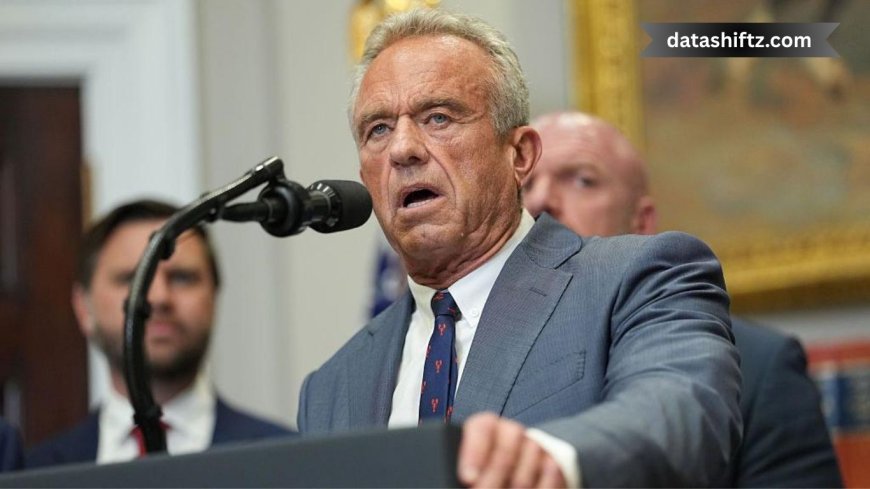RFK Jr. Cancels mRNA Vaccine Projects: A Major Shift in U.S. Health Policy

In a significant policy move, U.S. Health and Human Services (HHS) Secretary Robert F. Kennedy Jr. announced the cancellation of nearly $500 million in federal contracts related to mRNA vaccine development. This decision halts 22 projects aimed at combating respiratory viruses such as COVID-19, influenza, and H5N1. The move marks a pivotal shift in the U.S. government's approach to vaccine development and has sparked widespread debate.
What Led to the Cancellation?
Kennedy's decision stems from a comprehensive review conducted by the HHS, which raised concerns about the efficacy and safety of mRNA vaccines. Despite their role in mitigating the COVID-19 pandemic, mRNA vaccines have faced scrutiny regarding their long-term effectiveness against evolving respiratory viruses. Kennedy emphasized the need to invest in "safer, broader vaccine platforms" that offer more robust protection as viruses mutate.
Impacted Projects and Stakeholders
The cancellation affects a range of projects, including:
-
Moderna and University of Texas Medical Branch: Development of an mRNA vaccine targeting the H5N1 bird flu virus.
-
Emory University and Tiba Biotech: Research on an mRNA-based inhalable antiviral treatment.
-
Major Pharmaceutical Companies: Proposals from Pfizer, Sanofi Pasteur, and CSL Seqirus under BARDA's Rapid Response Partnership Vehicle.
Kennedy's decision has drawn criticism from various quarters. Former BARDA director Rick Bright described it as a "strategic misstep" that could undermine national security and preparedness for future pandemics. Critics argue that dismantling investments in mRNA technology may weaken the nation's defense against emerging biological threats.
Government's New Direction
In response to the cancellation, the HHS plans to redirect funding towards alternative vaccine platforms. These include whole-virus vaccines and novel immunization technologies that are perceived to have stronger safety records and transparent clinical and manufacturing data practices. Kennedy emphasized that this shift is not a rejection of vaccinations but a move towards solutions that offer broader and more durable protection.
Global Repercussions
This policy change has international implications, especially for countries that have relied on mRNA vaccines. The U.S. has been a significant contributor to global vaccine development, and this shift may influence global health strategies. Additionally, the decision could impact future collaborations and funding for international vaccine research initiatives.
Public and Expert Reactions
The cancellation has elicited a range of responses:
-
Supporters: Some public health advocates argue that diversifying vaccine platforms is essential for long-term pandemic preparedness.
-
Critics: Medical experts, including Dr. Paul Offit from the Children's Hospital of Philadelphia, have expressed concerns that abandoning mRNA technology could hinder progress in combating infectious diseases.
A New Era in Vaccine Development
As the U.S. pivots away from mRNA vaccines, the focus is shifting towards developing alternative vaccine platforms. The HHS is investing in technologies that offer broader protection against a range of respiratory viruses. While this transition may take time, it underscores the government's commitment to exploring diverse solutions to public health challenges.
Summary
| Aspect | Details |
|---|---|
| Decision | Cancellation of $500 million in mRNA vaccine projects |
| Number of Projects Affected | 22 projects |
| Primary Concern | Efficacy and safety of mRNA vaccines against evolving respiratory viruses |
| Alternative Focus | Investment in whole-virus vaccines and novel immunization technologies |
| Criticism | Concerns over undermining national security and preparedness |
| Global Impact | Potential influence on international vaccine strategies and collaborations |
Key Takeaways
-
Policy Shift: The U.S. is moving away from mRNA vaccines in favor of alternative platforms.
-
Strategic Concerns: The decision has raised questions about national security and pandemic preparedness.
-
Global Considerations: The policy change may affect global health strategies and collaborations.
As the situation evolves, it will be crucial to monitor the development of alternative vaccine platforms and their impact on public health.
Conclusion
The cancellation of nearly $500 million in mRNA vaccine projects by RFK Jr. marks a historic and controversial shift in U.S. health policy. While proponents argue that this move paves the way for safer and more broadly protective vaccine platforms, critics warn it could undermine pandemic preparedness and slow scientific progress. The decision highlights the delicate balance between innovation, safety, and public trust in vaccine development. As the government redirects funding toward alternative immunization technologies, both the scientific community and the public will be closely watching how these changes influence national and global health outcomes.




























